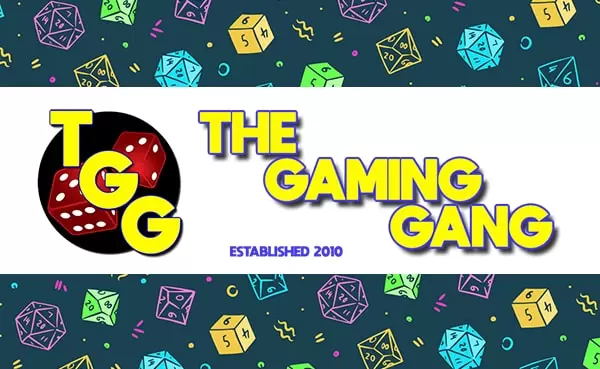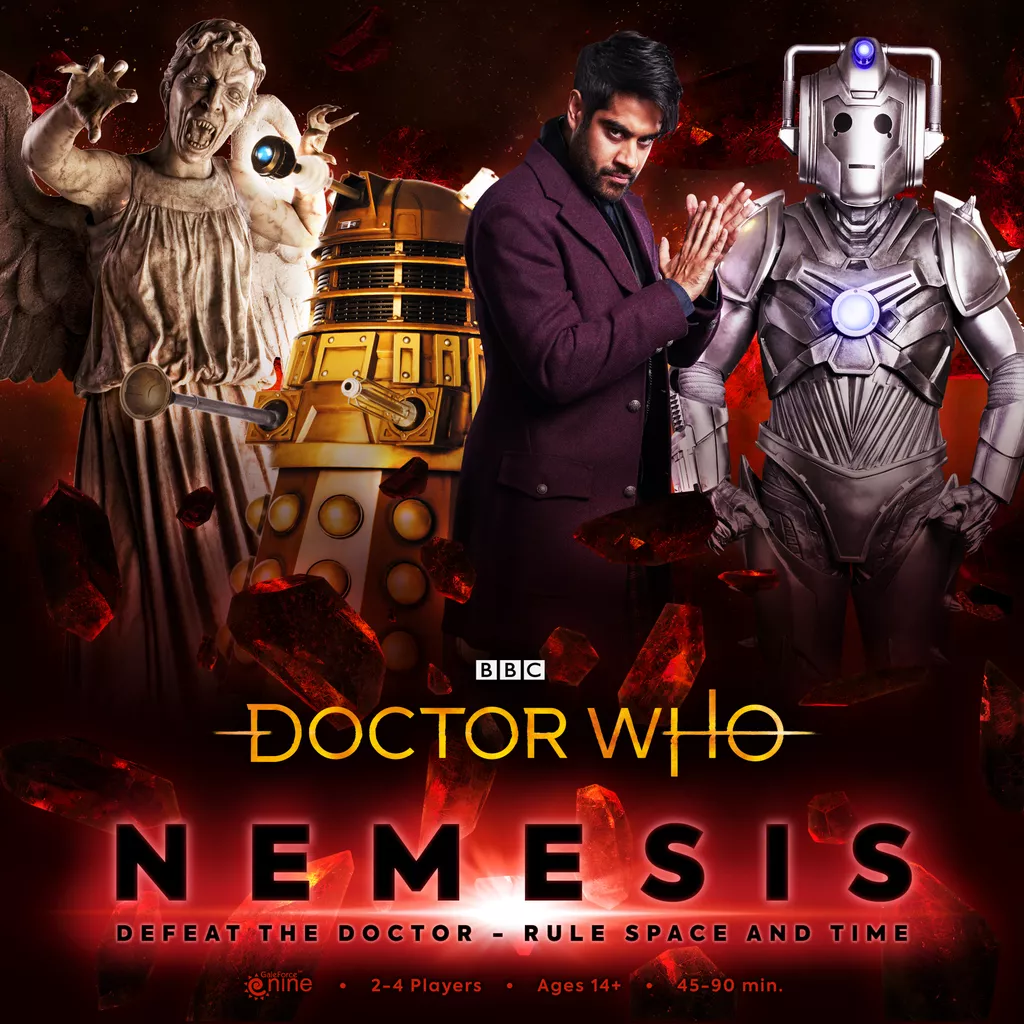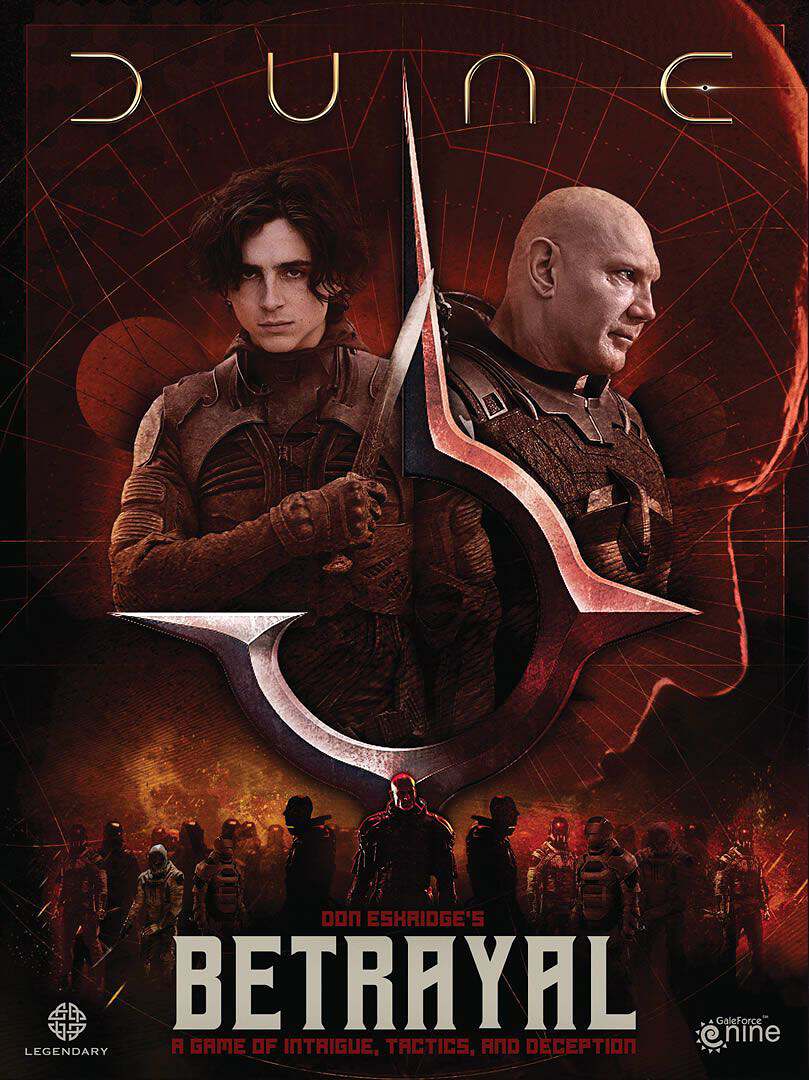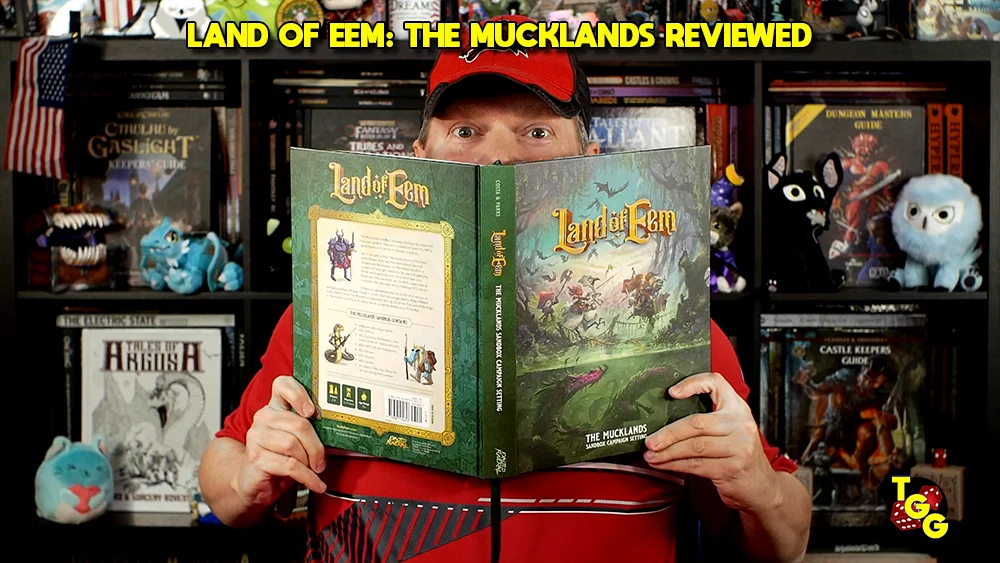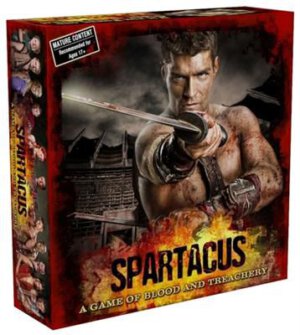
Publisher: Gale Force 9
Designers: Aaron Dill, John Kovaleski, and Sean Sweigart
Artist: Charles Woods
Year: 2012
Genre: Thematic game of negotiation, gladiatorial combat, and betrayal
Players: Three to four players
Ages: 17+
Playing Time: Two to three hours
MSRP: $39.99
Normally, games based on licensed movies or television shows are rather lacking in gameplay to say the least and sometimes are utter disasters at worst. Gale Force 9 jumped into the television licensed gaming arena (pun intended) with the release of Spartacus: A Game of Blood and Treachery at last year’s Gen Con. While Spartacus isn’t a perfect game by any stretch, and some of its appeal may turn out to based on your interest in the STARZ show, credit has to be given to GF9 for providing a solid gaming experience.
All in all the components for Spartacus are great and well designed, especially at a price point less than forty bucks. Granted the four gladiator figures are a bit soft on detail but the rest of the presentation is very nice. Much of the gameplay revolves around two decks of cards: The Market Deck which contains Gladiators, Equipment, and Slaves as well as the Intrigue Deck which holds Scheme, Reaction, and Guard cards. Each of the players’ House boards also hold special rules and starting assets applicable to that particular character. Also included in the mix is the Arena board where the gladiators will do battle and wagers are placed on the combats.
I’ll point out the TV series is heavily into sex and gore and Spartacus is intended for a mature audience. Although there is the occasional four letter word sprinkled through the game – and there’s some grue – you won’t spy any nudity. Yet this is a title you’ll want to know up front isn’t designed to be played with the kids by any stretch.
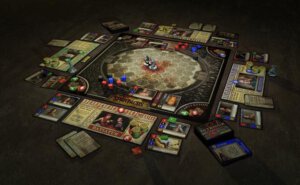
Influence is the name of the game and players look to gain that influence by hook or by crook: bribery, blackmail, crooked deals, theft, and even temporary alliances with your fellow Domini. Victory conditions are based on influence which can be adjusted depending on the length of game you’re interested in playing. The standard game plays out until a player reaches twelve from a starting point of one influence. To play a shorter game the starting influence of each house can be increased.
The game is broken into four phases:
Upkeep – Each player refreshes their exhausted uninjured cards. These assets include Slaves, Gladiators, and Guards. Slaves earn one gold per upkeep while each Gladiator will cost one gold. Guards are used to defeat schemes played against a player and cost no upkeep. If any of these cards were used in the previous turn but weren’t injured they are flipped right side up again so they can be utilized again this turn. Then any injured gladiators or slaves can be healed. On a roll of one they die from their wounds and on a roll of four or higher they are healed and refreshed as well; any other roll keeps the card out of play. Finally, any ready Gladiators and Slaves count toward earning and paying gold. If a Dominus can’t afford to pay for a Gladiator that card has to be discarded.
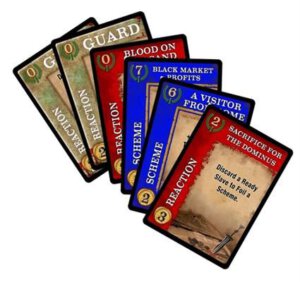
Let’s say Joe has a current Influence of four but wants to play a Scheme with a cost of six. Normally, Joe can’t play that card but if he can convince any player (or players) who have enough Influence to add to Joe’s total and reach that cost of six then the Scheme can be played. Joe has to declare which Dominus is the target of the Scheme – even if it’s himself – and can use a lot of avenues to gain that support such as paying players gold, promising support in return, offering an Asset card and so on. Intrigue cards can’t be traded though. Once support is given players cannot withdraw that support. Players can also bargain to prevent Joe from gaining the extra support as well. Promising support doesn’t affect the Influence level of the players; you’re just backing the Scheme and have your Influence level to throw behind any and all Schemes throughout the turn.
Where a lot of the fun, and backstabbing, takes place is in the fact Scheme cards don’t have to be revealed and you don’t have to tell the truth about what the scheme may be. How you conduct yourself during the Intrigue phase will no doubt have a lot to do with how much your fellow players will trust you throughout the game.
Once a Scheme has been successfully played other players can try to foil the Scheme. This is done through the play of Reaction cards as some of them allow you to throw a wrench in the works. These cards have an Influence cost as well but must be paid for by the player playing the card; Reaction cards don’t get support. If no one tries to foil the plan then the target of the Scheme can use a Guard (either on the table or in their hand) to defend the player. The Guard is discarded and on a die roll of four to six, the Scheme is foiled. Regardless if the Scheme is foiled or not, the Guard is discarded.
Once you complete your Intrigue phase you’ll make sure you don’t have more cards in your hand than your current limit. If so, you’ll discard down to your hand limit and play moves on to the next player.
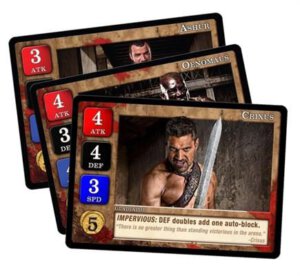
In the Open Market players can offer Assets to other players for gold or trade. This part of the phase lasts until players have no deals left to make or cards to sell to the bank. There’s no play order for the Open Market so it’s mainly a free for all. Once the Market is over all players collect all their gold from the table so their opponents don’t know exactly how much you have in your treasury.
Then the Auction begins and a number of Asset cards, equal to the number of players, are dealt face down to the center of the board. The first card is flipped face up and all players take the amount of gold they’d like to bid (even if the bid is zero gold) in their fist and hold their hand over the center. Once everyone has their bid in they’ll open their hand to reveal the bid. The high bidder then takes the card and pays their bid to the bank. In the case of a tie, a second round of bidding takes place between the tied players. This continues until there’s a clear high bidder. If a card receives a bid of zero from all bidders, or from all bidders in subsequent rounds to break ties, the card is discarded as this is a Failed Auction. Once all cards have been addressed in the Auction, play moves to the bid to Host the Arena.
As the Host of the Arena phase, a lot of benefits are bestowed upon the winner: higher influence, control of who’s fighting in the Arena, and going first in the next turn. The bidding works in the same way as the Auction except at any time there’s a Failed Auction the remaining bidders for Host roll a die and the high roller wins.
The Arena Phase – This is probably where many fans of the show are going to find if the game sinks or swims. First the Host receives an increase of one to their Influence and then looks to fill two slots in the games taking place in the Arena. The host decides who to invite in which to take part (including the host) and that Dominus may decide to accept or decline. If the Dominus accepts the invite, they’ll choose a Gladiator or Slave as the combatant as well as a single Weapon, Armor, and Special Equipment card if they have them available in order to equip the fighter. The participating Dominus then places their miniature in the Arena area.
If a Dominus declines the invitation, either because they don’t want to take part or can’t – as they don’t have any Slaves or Gladiators – they automatically lose one point of Influence. The Host can deviously use their position to solicit bribes of all sorts to offer an invite to the games or even to pass over someone to take part. A clever player can find hosting the Arena to be quite lucrative.
Those combatants who have Favor or Champion tokens receive a gold payout from the bank before the combat begins. A victorious combatant receives a favor token and three favor tokens are traded in for a Champion token. Once a Dominus gains a Champion in the Arena they receive a point of Influence. If a Dominus loses a champion in the Arena they also lose a point of Influence.
Prior to Combat all players may wager on the outcome be it the winner, the match ending in injury or even decapitation. Once all bets have been placed the Combat is ready to begin.
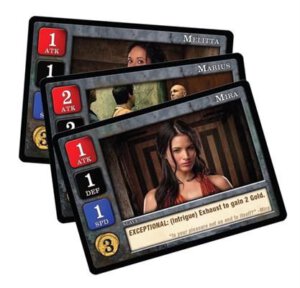
Each round of combat begins with a roll for initiative. Each player rolls a number of dice equal to their current SPD pool and the high roller chooses to go first or second in the round. In the case of a tie both simply reroll. During the combat round a fighter moves and attacks in whatever order they choose. The combatant may move as many hexes as they have in their SPD pool and fighters can attack any opponent in an adjacent hex.
To attack, the attacker rolls a number of dice equal to their current ATT pool while the target rolls dice equal to their fighter’s DEF pool. Each player then lines their dice in a row, highest to lowest, to compare the results. If the attack die is higher than the defense die then a wound is taken. If the defense die is higher than the attack then that die is blocked. Unopposed attack dice score a wound if the die is three or higher while unopposed defense dice are ignored. Every wound reduces the target’s dice pools by one which the defender can choose to remove from ATT, DEF, and/or SPD. No dice pool can be reduced to zero until all pools are lowered to one and this is where the level of defeat comes into play. If one pool is reduced to zero the target is yielding, if two pools are zeroed out then it’s an injury, and if all three are reduced to zero this is a decapitation. Many Gladiators have special abilities which can be triggered by rolling doubles or triples and a lot of Equipment cards have special abilities as well and these add additional spice so every Arena battle isn’t only monotonous dice rolling.
Once the combat is over it’s time to collect the winnings from your bets and if you backed the loser, or the result doesn’t match your bet, that gold goes to the bank.
Unless the defeated fighter is decapitated, the Host will have the opportunity to choose if the loser lives or dies. Once again, here’s one of the benefits of being the Host of the games. Yielding or injured combatants are now subject to the whim of the Host. Hosts can solicit bribes or favors before they give a thumbs up or thumbs down vote for life or death. With the thumbs up, the fighter lives and return to their house along with all of their equipment. The thumbs down will send the fighter to the great hereafter and their card is discarded while the fighter’s equipment is returned to the owner. A Host can’t simply vote thumbs down willy nilly as they’ll lose a point of Influence for each Favor token a fighter may have and Champions cannot be given a thumbs down.
The game continues until a phase (Influence, Market or Arena) ends with one Dominus holding an influence of twelve. It’s important to remember the phase has to end as there may be time left in the phase for another player to knock the leader’s Influence back below twelve. If more than one player finishes the phase tied with twelve those Domini will enter the Arena in a tournament to determine the game winner.
Spartacus: A Game of Blood and Treachery is my kind of game but I’ll be the first to point out this isn’t a title for everyone. I like good epic style games with plenty of player interaction, negotiation, and a whole lot of take that tossed into the mix. That said, those who like to play games in which they have no impact on the reactions of fellow players are sure to not be fans of Spartacus. Also, if you want your co-op game to be focused on cooperating against a common off board enemy will certainly not enjoy the experience. Plus anyone who dislikes violence or backstabbing in a game will surely want to steer clear.
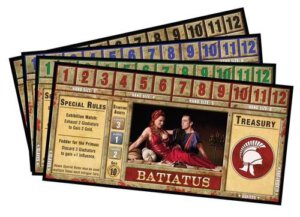
I understand with the wrong group of gamers, Spartacus is going to play out as a whole lot of same old same old each and every turn; if you’re not willing to invest in the spirit of the game, I’ll be the first to say you’ll hate this title! I understand this and want to make sure gamers who will not dig the mechanics in place aren’t going to come to the party thinking Spartacus: A Game of Blood and Treachery is anything other than what it is – it isn’t – and some folks will probably pee themselves knowing they have to negotiate with players outside of specific defined rules so wild and wooly gameplay results.
